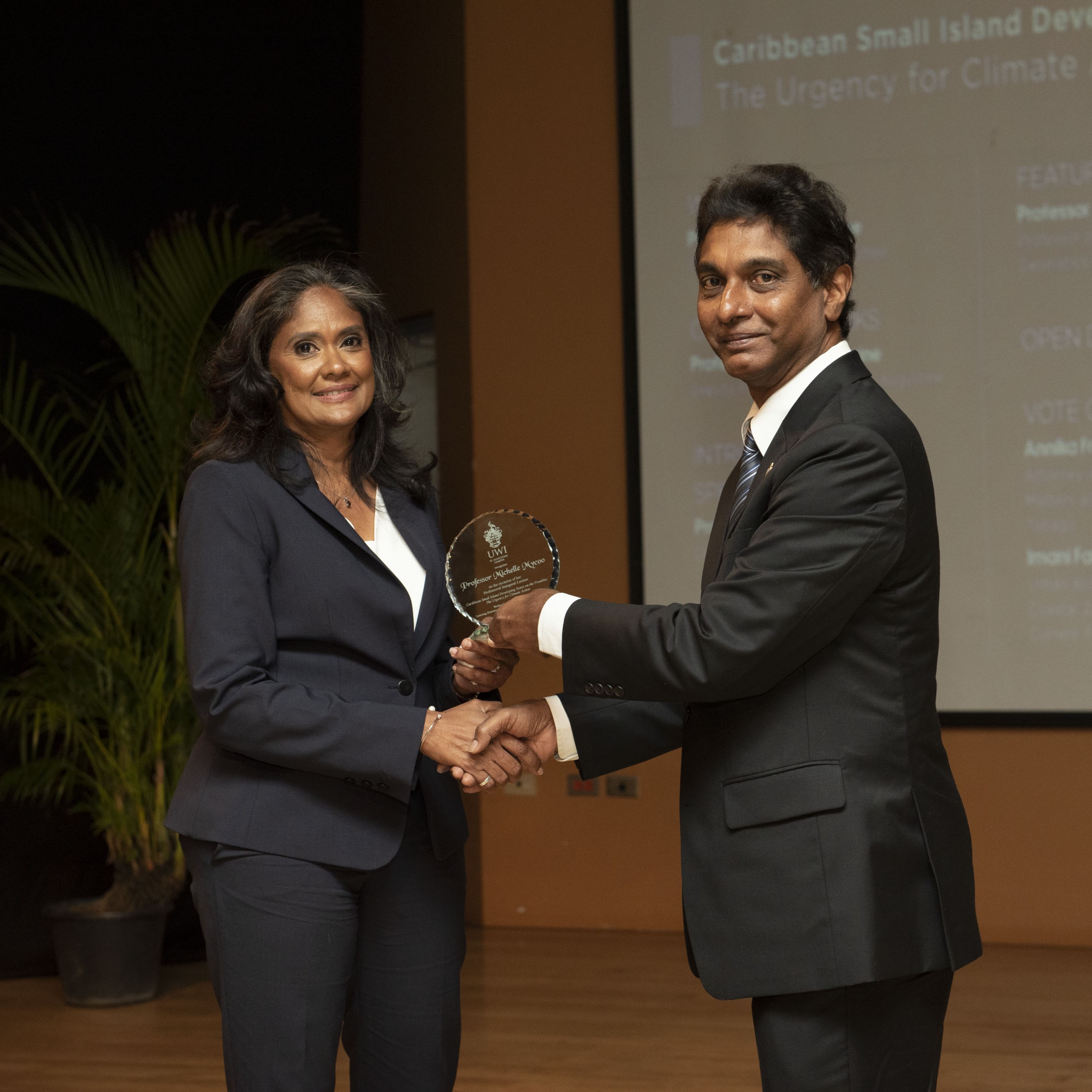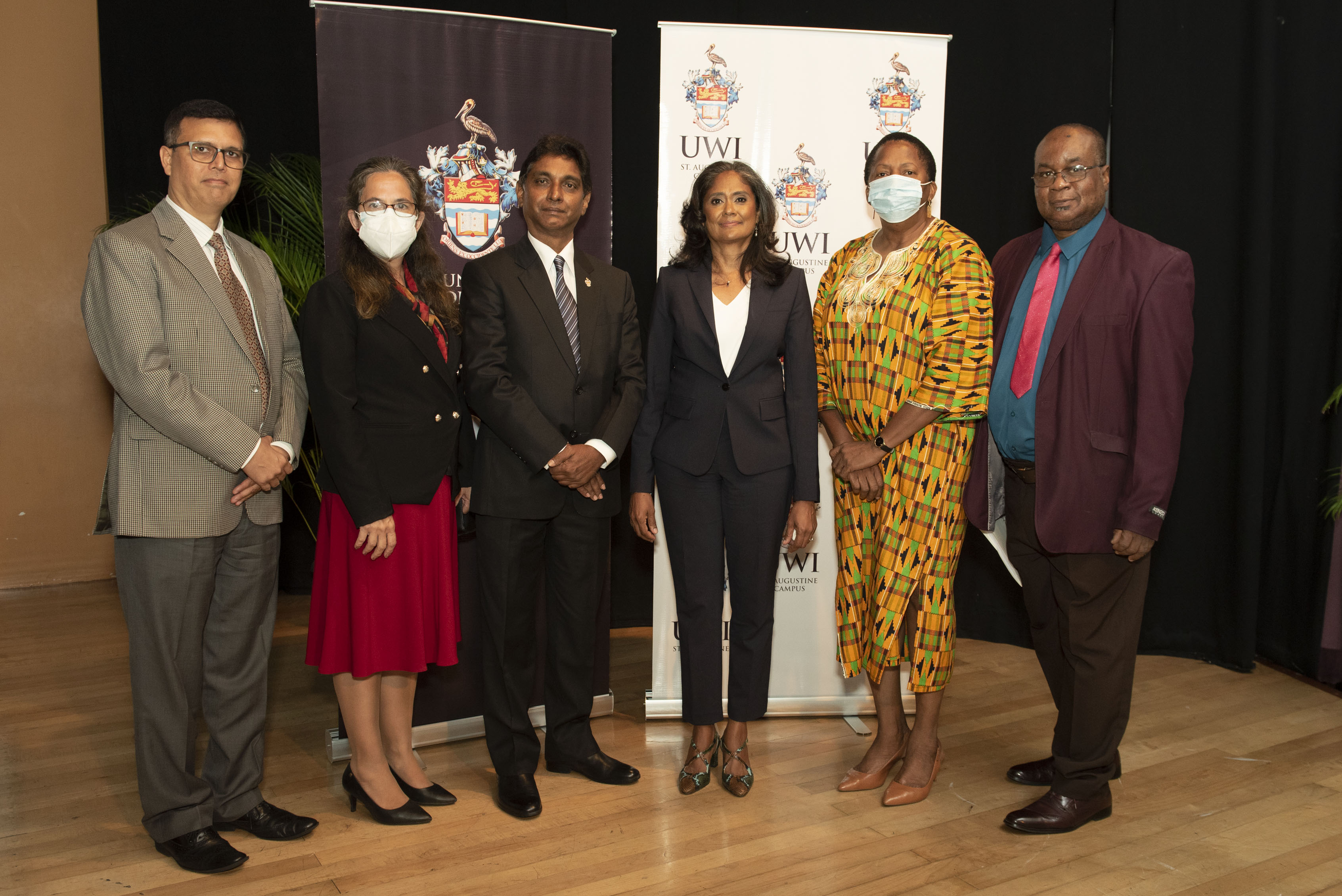News Releases
Nature stressed by Climate Change, UWI Professor Michelle Mycoo urges Climate Action
For Release Upon Receipt - March 28, 2023
St. Augustine

Professor Indar Ramnarine, Deputy Principal, The UWI St. Augustine Campus presents a commemorative token to Professor Michelle Mycoo, Professor of Urban and Regional Planning at The UWI St. Augustine Campus
ST. AUGUSTINE, Trinidad and Tobago. Tuesday 28 March 2023– “We are causing stress on nature and nature is responding by showing that it is being stressed by the impacts of climate change on small island developing states (SIDS)”, declared Professor Michelle Mycoo to an attentive audience at her Inaugural Professorial Lecture on Caribbean Small Island Developing States on the Frontline: The Urgency for Climate Action at the Learning Resource Centre in early March.
Professor Mycoo, who is the first woman to be elevated to the rank of Professor in the Faculty of Engineering at The UWI, is a member of the Intergovernmental Panel on Climate Change (IPCC). The IPCC is an intergovernmental body of the United Nations charged with advancing scientific knowledge about anthropogenic climate change. She was declared a co-laureate of the 2022 Gulbenkian Prize for Humanity and, for over 25 years, has conducted research in small islands developing states on urban planning and human settlements, climate change adaptation, water management, disaster risk reduction and integrated coastal zone management.
“The scientific evidence is unequivocal: climate change is a threat to human well-being and health of the planet. Any further delay in concerted global action will miss the brief, rapidly closing window to secure a liveable future,” explained the Professor of Urban and Regional Planning, drawing on the IPCC Climate Change 2022 - Impacts, Adaptation, And Vulnerability Report.
Professor Mycoo noted that climate changes are widespread, rapid, intensifying, unprecedented and the world is not on track to limit global warming to 1.5 degrees Celsius. Carbon dioxide concentrations are currently the highest in 2 million years, sea level rise, the fastest in 3000 years; Arctic Sea ice area, the lowest level in 1000 years; and glacial retreat is unprecedented in at least 2000 years.
“SIDS are considered hot spots and experience temperature increases, growing impacts of tropical cyclones and storm surges, droughts and changing precipitation patterns, rising sea levels, coral bleaching, and entry of invasive species” and, according to the IPCC report, all these changes are already detectable across both the natural and human systems for the Caribbean.
Stressing the importance of immediate action, she reiterated that the effects of global degradation trickle down to SIDS and can have serious impacts on the economy in term of fisheries and food security, the extinction of certain species, agriculture, water, health, marine ecosystems especially the coral reef environments and the built environment and infrastructure.

L-R Mr. Raju Sharma, Chargé d’Affaires of the High Commission of India, Her Excellency Tania Diego Olite, Ambassador from the Republic of Cuba to the Republic of Trinidad and Tobago, Professor Indar Ramnarine, Deputy Principal, The UWI St. Augustine Campus, Professor Michelle Mycoo, Professor of Urban and Regional Planning at The UWI St. Augustine Campus, The Honourable Pennelope Beckles-Robinson, Minister of Planning and Development and Professor Edwin Ikenna Ekwue, Dean of the Faculty of Engineering.
Professor Mycoo detailed three adaptation responses - protection, retreat, and accountability - and noted that some measures of coastal protection and accommodation are being utilized in terms of what nature has to offer to reduce climate risks. In contrast, barriers remain such as lack of political will, management capacity, limited financial means and mechanisms, and competing priorities. She suggested that gender responsive and inclusive action can accelerate transformative climate change adaptation, prioritizing investment to reduce climate risks for low income and marginalized residents and informal settlements. With regard to future adaptation, land use planners must use projected sea level rise scenarios for zoning plans and policies.
Deputy Principal of the St. Augustine Campus Professor Indar Ramnarine, in congratulating Professor Mycoo on her elevation to the rank of professor, noted that “Professorial Inaugural Lectures remind us that scholarship remains at the heart of The UWI. Describing these lectures as a rite of passage for Professors, he emphasized that they “should not pass without notice by the campus community, and the wider public”. He pointed out that the challenge of the global climate crisis has long engaged this activist university and, in light of the current climate crisis
To view the recording of Professor Mycoo’s Inaugural Professorial Lecture please visit The UWI St. Augustine YouTube Channel: https://www.youtube.com/watch?v=ByxH5X033-Q
END
About The University of the West Indies
The UWI has been and continues to be a pivotal force in every aspect of Caribbean development; residing at the centre of all efforts to improve the well-being of people across the region. From a university college of London in Jamaica with 33 medical students in 1948, The UWI is today an internationally respected, global university with near 50,000 students and five campuses: Monain Jamaica, St. Augustine in Trinidad and Tobago, Cave Hillin Barbados, Five IslandsinAntigua and Barbuda and itsOpen Campus, and 10 global centres in partnership with universities in North America, Latin America, Asia, Africa and Europe.
The UWI offers over 800 certificate, diploma, undergraduate and postgraduate degree options in Culture, Creative and Performing Arts, Food and Agriculture, Engineering, Humanities and Education, Law, Medical Sciences, Science and Technology, Social Sciences, and Sport. As the Caribbean’s leading university, it possesses the largest pool of Caribbean intellect and expertise committed to confronting the critical issues of our region and wider world.
The UWI has been consistently ranked among the top universities globally by the most reputable ranking agency, Times Higher Education (THE). In the latest World University Rankings 2022, released in September 2021, The UWI moved up an impressive 94 places from last year. In the current global field of some 30,000 universities and elite research institutes, The UWI stands among the top 1.5%.
The UWI is the only Caribbean-based university to make the prestigious lists since its debut in the rankings in 2018. In addition to its leading position in the Caribbean, it is also in the top 20 for Latin America and the Caribbean and the top 100 global Golden Age universities (between 50 and 80 years old). The UWI is also featured among the leading universities on THE’s Impact Rankings for its response to the world’s biggest concerns, outlined in the 17 United Nations Sustainable Development Goals (SDGs), including Good Health and Wellbeing; Gender Equality and Climate Action.
For more, visit www.uwi.edu
Contact
Marketing and Communications Department
- Tel.: (868)-662-2002 ext.2013/2014
- Email: marketing.communications@sta.uwi.edu

